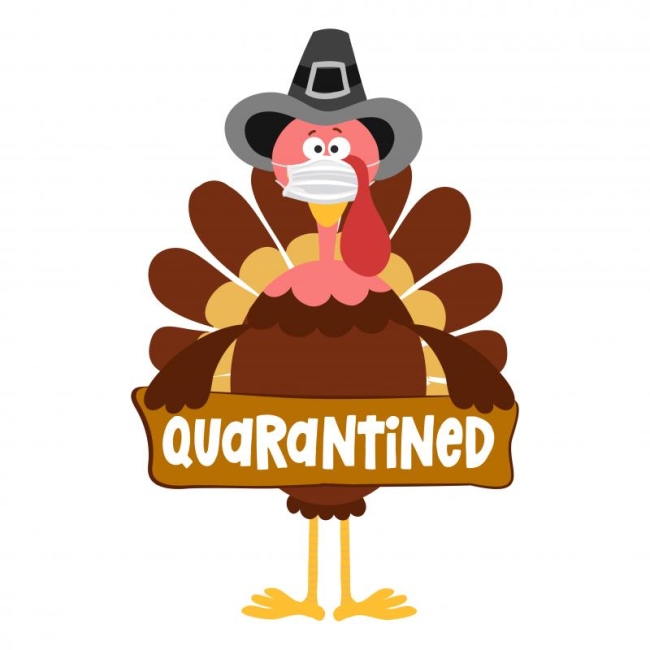You have /5 articles left.
Sign up for a free account or log in.

Azindianlany/iStock/Getty Images Plus
A small number of colleges have announced plans to shift to remote instruction after Thanksgiving break due to COVID-19 concerns.
Switching to remote instruction after Thanksgiving vacation was a common approach last fall, when many colleges and universities built their academic calendars around the goal of limiting student transit to and from campus. This year it appears to be a small minority of colleges that have announced plans for remote instruction after Thanksgiving, though more may follow suit as Thanksgiving grows closer.
Edward Waters University, a historically Black Christian institution in Florida, announced that it would close residence halls Nov. 21, with all post-Thanksgiving classes to be held remotely (student athletes can request a waiver to remain on campus).
"From a health and safety perspective, ending on-campus fall 2021 semester courses and activities prior to Thanksgiving will limit the movement of students and faculty, mitigating the exposure and possible proliferation that may result from holiday travel," Donna H. Oliver, Edward Waters’ provost, said in a memo to faculty, staff and students announcing the plans.
Sierra Nevada University, a private university in Nevada, is also planning on remote instruction after Thanksgiving break. “The reasons for not returning students to campus are straightforward -- the risk associated with travel to/from campus from across the state and country, our desire to do our part to minimize risk to our surrounding community, and the logistics of keeping campus operations and services open beyond the end of the semester should a student require quarantine due to exposure or infection,” the university said in an Aug. 25 announcement.
Itawamba Community College, in Mississippi, said in a Sept. 17 announcement that it planned for most in-person classes to conclude prior to the Thanksgiving break. “Greatly reducing the number of students on campus after the holiday will greatly reduce the quarantining of students with such a limited window before final exams,” said Jay Allen, the college’s president.
California State University at Fresno is considering a post-Thanksgiving transition online. “The university is considering a number of options, if necessary, including the transition of all in-person classes to virtual after the Thanksgiving holiday,” a CSU Fresno spokeswoman said. “A final decision has not been made. Any such decision will take into consideration guidance from local public health officials and from the CSU Office of the Chancellor.”
Gerri Taylor, the co-chair of the American College Health Association’s COVID-19 task force, said shifting to remote instruction after Thanksgiving, as many colleges did last year, “was a good strategy in order to prevent the spread of infection because of traveling back and forth back and forth for Thanksgiving. I think it’s something colleges should consider.”
In weighing those considerations this fall, Taylor said colleges should consider student vaccination rates -- and she said all colleges should be encouraging unvaccinated students to begin getting vaccinated now, so they have time to gain full protection prior to the Thanksgiving holiday.
“If they have students who are unvaccinated and they’re going back and forth, that’s more opportunity for exposure if they’re carrying the virus, and certainly they shouldn’t travel if they’re sick at all,” she said. “They should definitely get tested to make sure it’s not COVID before they attempt to travel home.”
Chris Marsicano, assistant professor of the practice of higher education at Davidson College and the founding director of the College Crisis Initiative, a research initiative that has studied colleges” responses to COVID-19, said the widespread availability of highly effective vaccines makes Thanksgiving considerations very different for colleges this fall compared to last fall.
"This time last year, there was a legitimate public health threat, which is, we knew that when students moved from their homes to a college campus at the beginning of last year, they brought COVID with them," he said. "Given that prevaccine reality, any movement of students period from one place to another was likely to spread the disease and more importantly would have deleterious effects on older Americans, the 70-plus population. This Thanksgiving most college students will be vaccinated, and most of the elders with whom they spend their Thanksgiving dinner will have been vaccinated and also [have] received booster shots.”
Marsicano did note, however, that young children are not likely to be vaccinated by then. “I don’t want to suggest COVID-19 is over, but COVID-19 with respect to how colleges and universities should react around holidays and transit and movement and mobility -- it’s a different ball game. The rules of the game are different and the risks are very, very different.”




